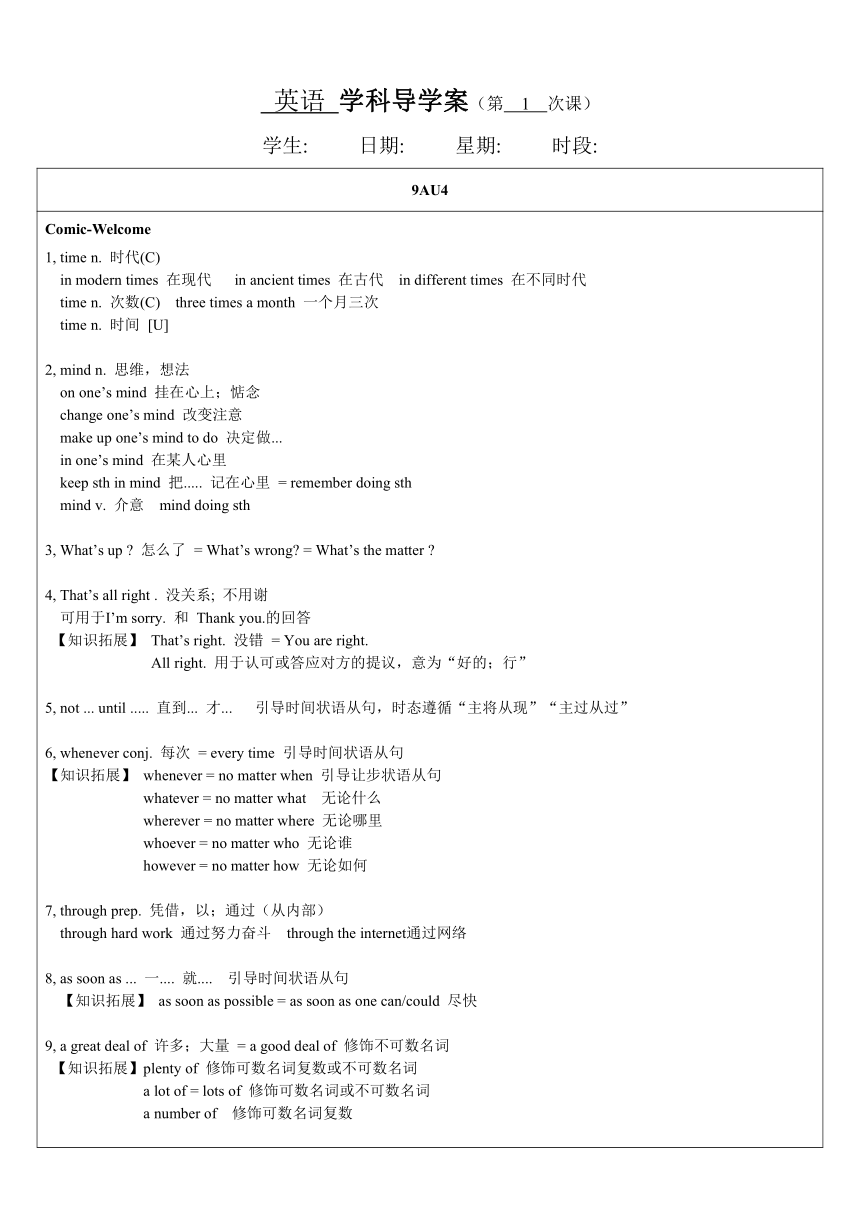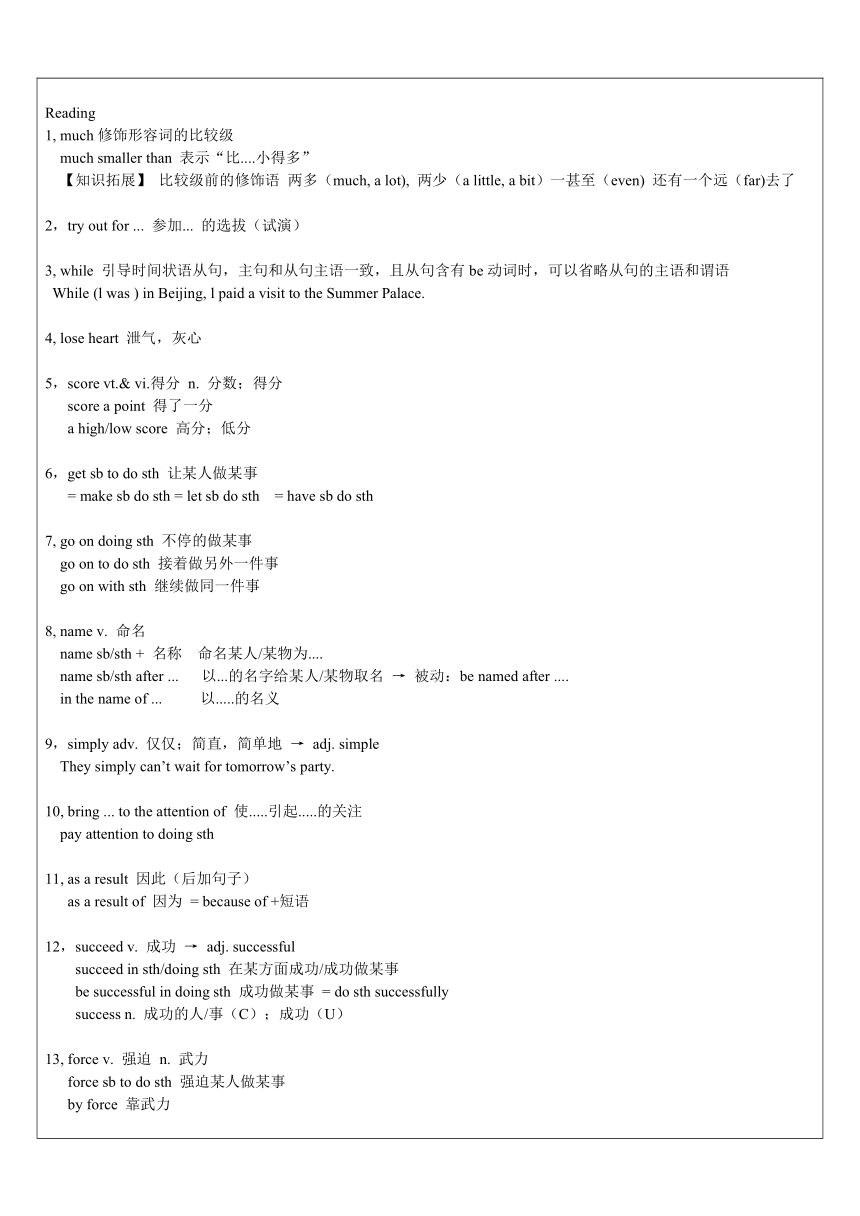Unit 4 Growing up 知识点 2024-2025学年牛津译林版九年级英语上册
文档属性
| 名称 | Unit 4 Growing up 知识点 2024-2025学年牛津译林版九年级英语上册 |  | |
| 格式 | docx | ||
| 文件大小 | 28.4KB | ||
| 资源类型 | 教案 | ||
| 版本资源 | 牛津译林版 | ||
| 科目 | 英语 | ||
| 更新时间 | 2024-06-21 11:55:55 | ||
图片预览


文档简介
英语 学科导学案(第 1 次课)
学生: 日期: 星期: 时段:
9AU4
Comic-Welcome 1, time n. 时代(C) in modern times 在现代 in ancient times 在古代 in different times 在不同时代 time n. 次数(C) three times a month 一个月三次 time n. 时间 [U] 2, mind n. 思维,想法 on one’s mind 挂在心上;惦念 change one’s mind 改变注意 make up one’s mind to do 决定做... in one’s mind 在某人心里 keep sth in mind 把..... 记在心里 = remember doing sth mind v. 介意 mind doing sth 3, What’s up 怎么了 = What’s wrong = What’s the matter 4, That’s all right . 没关系; 不用谢 可用于I’m sorry. 和 Thank you.的回答 【知识拓展】 That’s right. 没错 = You are right. All right. 用于认可或答应对方的提议,意为“好的;行” 5, not ... until ..... 直到... 才... 引导时间状语从句,时态遵循“主将从现”“主过从过” 6, whenever conj. 每次 = every time 引导时间状语从句 【知识拓展】 whenever = no matter when 引导让步状语从句 whatever = no matter what 无论什么 wherever = no matter where 无论哪里 whoever = no matter who 无论谁 however = no matter how 无论如何 7, through prep. 凭借,以;通过(从内部) through hard work 通过努力奋斗 through the internet通过网络 8, as soon as ... 一.... 就.... 引导时间状语从句 【知识拓展】 as soon as possible = as soon as one can/could 尽快 9, a great deal of 许多;大量 = a good deal of 修饰不可数名词 【知识拓展】plenty of 修饰可数名词复数或不可数名词 a lot of = lots of 修饰可数名词或不可数名词 a number of 修饰可数名词复数 Reading 1, much修饰形容词的比较级 much smaller than 表示“比....小得多” 【知识拓展】 比较级前的修饰语 两多(much, a lot), 两少(a little, a bit)一甚至(even) 还有一个远(far)去了 try out for ... 参加... 的选拔(试演) 3, while 引导时间状语从句,主句和从句主语一致,且从句含有be动词时,可以省略从句的主语和谓语 While (l was ) in Beijing, l paid a visit to the Summer Palace. 4, lose heart 泄气,灰心 score vt.& vi.得分 n. 分数;得分 score a point 得了一分 a high/low score 高分;低分 get sb to do sth 让某人做某事 = make sb do sth = let sb do sth = have sb do sth 7, go on doing sth 不停的做某事 go on to do sth 接着做另外一件事 go on with sth 继续做同一件事 8, name v. 命名 name sb/sth + 名称 命名某人/某物为.... name sb/sth after ... 以...的名字给某人/某物取名 → 被动:be named after .... in the name of ... 以.....的名义 simply adv. 仅仅;简直,简单地 → adj. simple They simply can’t wait for tomorrow’s party. 10, bring ... to the attention of 使.....引起.....的关注 pay attention to doing sth 11, as a result 因此(后加句子) as a result of 因为 = because of +短语 succeed v. 成功 → adj. successful succeed in sth/doing sth 在某方面成功/成功做某事 be successful in doing sth 成功做某事 = do sth successfully success n. 成功的人/事(C);成功(U) 13, force v. 强迫 n. 武力 force sb to do sth 强迫某人做某事 by force 靠武力 14, remain v. 逗留,停留 remain也可做系动词:保持 * sth remains to be done 某事仍需要处理 achievement n.成就 → v. achieve make great achievements 取得重大成就 16, proud adj. 自豪的;骄傲的 → n. pride proud - prouder - proudest be proud of ... = take pride in ... be the pride of.... 是... 的骄傲 17, prove v. 证明 prove + 名词/代词 prove + that 从句 【知识拓展】prove 做系动词,相当于turn out,后接形容词,名词或不定式做表语 matter v. 重要,要紧 n. 事情 It doesn't matter. 不要紧 What’s the matter 你怎么了 Grammar be tired out 筋疲力尽 be tired of 厌倦...., 厌烦..... receive 收到,表示客观上收到,并不意味着愿意接受 accept 接受,表示主观上愿意接受 l received an invitation to the party yesterday, but l refused to accept it. 3, It is the first time/最高级 + that 从句,从句时态通常用现在完成时 It is the first time that l have met her. 4, against prep. 对抗;与... 相反;靠着 Are you for or against the idea against the wall 靠着墙 Integrated-Task break out 爆发 The war broke out in 1939. break down 出故障 break into 闯入 break up 粉碎 break off 中断 including prep. 包括,后常接名词或代词 include v.包括 【知识拓展】included adj. 包括在内的,置于被修饰词的后面做定语 Everyone is working hard, me included. record v.记录 n. 记录 (C) keep a record 保持记录 break a record 打破记录 make a record 创造记录 die of 死于(内部原因) die from 死于(外部原因) die out 灭绝 die v. 死 → n. death → adj. dying奄奄一息的 dead 死掉的 5, have sth done 让某事被做 【知识拓展】 have sth to do 有事要做 have sb do sth 让某人做某事 *have sb doing sth 让某人一直做某事 6, German adj. 德国(人)的 n. 德国人(复数);德语 Germans Germany 德国 7, keep (on) doing sth 继续(重复)做某事 keep sb doing sth 让某人一直做 keep sb from doing sth 阻止某人做某事 keep sb +形容词/副词/介词短语 使... 处于某种状态 8, thought n. 想法(C);思维(U) think v. 想,思考 think - thought - thought 9, survive v.幸存 → n. survivor survive sth 在... 中幸存下来 survive on .... 靠....生存 10, pity n. 遗憾;同情 What a pity. 真遗憾,真可惜 have pity on ... 对... 同情 11, fear n.恐惧 in fear of ... 为.... 担忧,害怕.... 12, sell well畅销,没有被动 sell out 卖光,常用被动 be sold out 13, unusual adj. 不同寻常的 <反义> usual 【知识拓展】 fair-unfair popular-unpopular lucky-unlucky friendly-unfriendly 14, surprise n.惊讶 to one’s surprise 令某人惊讶的是 in surprise 惊讶地 【知识拓展】 to one’s joy令某人高兴的是 * to one’s satisfaction 令某人满意的是 15, full of 充满,在句中可充当后置定语修饰名词 be full of ... = be filled with... 16, in one’s + 整十数词的复数 表示某人年龄处于几十多岁 in one’s thirties/forties/nineties 在某人三十几岁/四十几岁时/九十几岁 【知识拓展】 in the seventies/eighties 在七十年代 / 八十年代 重点语法-时间状语从句 由before, after, when, while 引导的实际状语从句 ①before意为 “在....之前” 还有多久才 She worked in Shanghai before he came here. ②after 意为 “在....之后” After you think it over, please let me know your decision. ③when 意为 “当....时”,when引导的从句中谓语动词可以是短暂的,也可以是延续的 When l got home, my mum was cooking dinner. ④while 意为 “在...期间”; “当....时” while 引导的从句中谓语动词必须为延续性动词 You can go swimming while l am having lunch. 由since, till, until 引导的时间状语从句 ① since 意为 “自从....以后” Since l graduated from university, it is/has been ten years. ② till与until可以表示 “到....为止” not.... until .... 直到...才.... 主句中的谓语动词必须为短暂性动词 由 as soon as ...和 whenever 引导的时间状语从句 as soon as ... 表示 “一... 就.... ” Carol answered the doors as soon as l knocked. whenever 意为 “每当....” He asked about my health whenever he met me.
学生: 日期: 星期: 时段:
9AU4
Comic-Welcome 1, time n. 时代(C) in modern times 在现代 in ancient times 在古代 in different times 在不同时代 time n. 次数(C) three times a month 一个月三次 time n. 时间 [U] 2, mind n. 思维,想法 on one’s mind 挂在心上;惦念 change one’s mind 改变注意 make up one’s mind to do 决定做... in one’s mind 在某人心里 keep sth in mind 把..... 记在心里 = remember doing sth mind v. 介意 mind doing sth 3, What’s up 怎么了 = What’s wrong = What’s the matter 4, That’s all right . 没关系; 不用谢 可用于I’m sorry. 和 Thank you.的回答 【知识拓展】 That’s right. 没错 = You are right. All right. 用于认可或答应对方的提议,意为“好的;行” 5, not ... until ..... 直到... 才... 引导时间状语从句,时态遵循“主将从现”“主过从过” 6, whenever conj. 每次 = every time 引导时间状语从句 【知识拓展】 whenever = no matter when 引导让步状语从句 whatever = no matter what 无论什么 wherever = no matter where 无论哪里 whoever = no matter who 无论谁 however = no matter how 无论如何 7, through prep. 凭借,以;通过(从内部) through hard work 通过努力奋斗 through the internet通过网络 8, as soon as ... 一.... 就.... 引导时间状语从句 【知识拓展】 as soon as possible = as soon as one can/could 尽快 9, a great deal of 许多;大量 = a good deal of 修饰不可数名词 【知识拓展】plenty of 修饰可数名词复数或不可数名词 a lot of = lots of 修饰可数名词或不可数名词 a number of 修饰可数名词复数 Reading 1, much修饰形容词的比较级 much smaller than 表示“比....小得多” 【知识拓展】 比较级前的修饰语 两多(much, a lot), 两少(a little, a bit)一甚至(even) 还有一个远(far)去了 try out for ... 参加... 的选拔(试演) 3, while 引导时间状语从句,主句和从句主语一致,且从句含有be动词时,可以省略从句的主语和谓语 While (l was ) in Beijing, l paid a visit to the Summer Palace. 4, lose heart 泄气,灰心 score vt.& vi.得分 n. 分数;得分 score a point 得了一分 a high/low score 高分;低分 get sb to do sth 让某人做某事 = make sb do sth = let sb do sth = have sb do sth 7, go on doing sth 不停的做某事 go on to do sth 接着做另外一件事 go on with sth 继续做同一件事 8, name v. 命名 name sb/sth + 名称 命名某人/某物为.... name sb/sth after ... 以...的名字给某人/某物取名 → 被动:be named after .... in the name of ... 以.....的名义 simply adv. 仅仅;简直,简单地 → adj. simple They simply can’t wait for tomorrow’s party. 10, bring ... to the attention of 使.....引起.....的关注 pay attention to doing sth 11, as a result 因此(后加句子) as a result of 因为 = because of +短语 succeed v. 成功 → adj. successful succeed in sth/doing sth 在某方面成功/成功做某事 be successful in doing sth 成功做某事 = do sth successfully success n. 成功的人/事(C);成功(U) 13, force v. 强迫 n. 武力 force sb to do sth 强迫某人做某事 by force 靠武力 14, remain v. 逗留,停留 remain也可做系动词:保持 * sth remains to be done 某事仍需要处理 achievement n.成就 → v. achieve make great achievements 取得重大成就 16, proud adj. 自豪的;骄傲的 → n. pride proud - prouder - proudest be proud of ... = take pride in ... be the pride of.... 是... 的骄傲 17, prove v. 证明 prove + 名词/代词 prove + that 从句 【知识拓展】prove 做系动词,相当于turn out,后接形容词,名词或不定式做表语 matter v. 重要,要紧 n. 事情 It doesn't matter. 不要紧 What’s the matter 你怎么了 Grammar be tired out 筋疲力尽 be tired of 厌倦...., 厌烦..... receive 收到,表示客观上收到,并不意味着愿意接受 accept 接受,表示主观上愿意接受 l received an invitation to the party yesterday, but l refused to accept it. 3, It is the first time/最高级 + that 从句,从句时态通常用现在完成时 It is the first time that l have met her. 4, against prep. 对抗;与... 相反;靠着 Are you for or against the idea against the wall 靠着墙 Integrated-Task break out 爆发 The war broke out in 1939. break down 出故障 break into 闯入 break up 粉碎 break off 中断 including prep. 包括,后常接名词或代词 include v.包括 【知识拓展】included adj. 包括在内的,置于被修饰词的后面做定语 Everyone is working hard, me included. record v.记录 n. 记录 (C) keep a record 保持记录 break a record 打破记录 make a record 创造记录 die of 死于(内部原因) die from 死于(外部原因) die out 灭绝 die v. 死 → n. death → adj. dying奄奄一息的 dead 死掉的 5, have sth done 让某事被做 【知识拓展】 have sth to do 有事要做 have sb do sth 让某人做某事 *have sb doing sth 让某人一直做某事 6, German adj. 德国(人)的 n. 德国人(复数);德语 Germans Germany 德国 7, keep (on) doing sth 继续(重复)做某事 keep sb doing sth 让某人一直做 keep sb from doing sth 阻止某人做某事 keep sb +形容词/副词/介词短语 使... 处于某种状态 8, thought n. 想法(C);思维(U) think v. 想,思考 think - thought - thought 9, survive v.幸存 → n. survivor survive sth 在... 中幸存下来 survive on .... 靠....生存 10, pity n. 遗憾;同情 What a pity. 真遗憾,真可惜 have pity on ... 对... 同情 11, fear n.恐惧 in fear of ... 为.... 担忧,害怕.... 12, sell well畅销,没有被动 sell out 卖光,常用被动 be sold out 13, unusual adj. 不同寻常的 <反义> usual 【知识拓展】 fair-unfair popular-unpopular lucky-unlucky friendly-unfriendly 14, surprise n.惊讶 to one’s surprise 令某人惊讶的是 in surprise 惊讶地 【知识拓展】 to one’s joy令某人高兴的是 * to one’s satisfaction 令某人满意的是 15, full of 充满,在句中可充当后置定语修饰名词 be full of ... = be filled with... 16, in one’s + 整十数词的复数 表示某人年龄处于几十多岁 in one’s thirties/forties/nineties 在某人三十几岁/四十几岁时/九十几岁 【知识拓展】 in the seventies/eighties 在七十年代 / 八十年代 重点语法-时间状语从句 由before, after, when, while 引导的实际状语从句 ①before意为 “在....之前” 还有多久才 She worked in Shanghai before he came here. ②after 意为 “在....之后” After you think it over, please let me know your decision. ③when 意为 “当....时”,when引导的从句中谓语动词可以是短暂的,也可以是延续的 When l got home, my mum was cooking dinner. ④while 意为 “在...期间”; “当....时” while 引导的从句中谓语动词必须为延续性动词 You can go swimming while l am having lunch. 由since, till, until 引导的时间状语从句 ① since 意为 “自从....以后” Since l graduated from university, it is/has been ten years. ② till与until可以表示 “到....为止” not.... until .... 直到...才.... 主句中的谓语动词必须为短暂性动词 由 as soon as ...和 whenever 引导的时间状语从句 as soon as ... 表示 “一... 就.... ” Carol answered the doors as soon as l knocked. whenever 意为 “每当....” He asked about my health whenever he met me.
